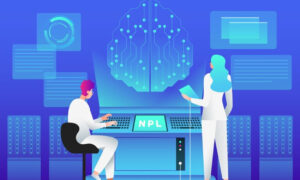What is the Role of AI in Custom Software Development?
December 12, 2024
Artificial intelligence in custom software has disrupted most industries, and this is no exception. It automates complicated processes, enriches decision-making, and enhances user experience, hence being at the forefront of how businesses design software tailor-made to meet specific needs. It’s all about crafting solutions for particular business needs in a Custom Software Development company; with the integration of AI, it goes much faster, wittier, and more efficiently.

Automating Repetitive Development Tasks
AI in software development makes the usual tasks a lot easier and faster, simplifying processes in the field of software development, and enabling the actual development teams to shift more focus toward high-priority activities. This automation accelerates project timelines and reduces costs.
Code Generation: AI-driven tools such as GitHub Copilot have been helping developers with the building of boilerplate code and suggesting optimized snippets.
Testing and Debugging: AI automated Unit Testing and Regression Testing by spotting impending errors and inconsistencies in code with very little human intervention.
Automation of Deployment: AI smoothes deployment pipelines by automating configurations and monitoring.
Data-Driven Decision Making
It also helps in AI software development by providing useful insights, so better decisions are made as large data is getting organized. The insights from AI make sure developers also render the software relevant, scalable, and user-friendly.
Requirements Analysis: AI tools analyze business requirements based on user data to recommend features and functionalities best suited for the end-user.
Predictive Analytics: AI predicts potential challenges and trends for Active Users to help them make an informed decision over software updates and scaling strategy.
Prioritization: AI models develop the list of development tasks in order of priority, considering urgency, impact, and resource availability.
Read Also: Why Automation Testing is Important for Software Development?
Enhanced User Experience (UX)
AI advances the abilities of custom software through the personalization of user interactions, playing a crucial Role of AI in enterprises. Businesses that lead through a user-centric design will have an advantage in the market by offering software solutions that meet customers’ preferences.
Personalized suggestions: AI systems analyze user behaviour and make personalized suggestions aimed at enhancing engagement and satisfaction.
NLP: AI developers have intuitive interactions, such as through chatbots and voice assistants; this makes communication between users and software seamless.
Behavior Prediction: AI makes the prediction of users’ actions and optimizes accordingly the elements of the interface for a more pleasant user experience.
Faster Development Speed
AI-powered tools bring down the time-to-market for customized software development. With the going-to-market speed advantage, businesses are, therefore, certain of prompt responses to market demands and keeping competitors who may be relevant at bay.
Prototyping: AI allows for prototyping and wireframing, based on some preliminary input, to have teams focus on the validation of ideas.
AI-Driven Development: AI-enabled tools support code optimization suggestions, highlighting redundancies and ways to enhance system performance.
Continuous Integration/Continuous Deployment: AI smooths the path of CI/CD pipelines, thus enabling quicker iterations and easier deployments.
Software Quality Improvement
AI enhances the quality by finding vulnerabilities, improving performance, and increasing the reliability of custom software. The Benefits of AI in custom software lead to enhanced reliability, customer satisfaction, and long-term cost savings.
Error Detection: AI-powered systems scan codebases for possible errors and fix them before deployment.
Performance Improvement: AI continually monitors application performance and gives recommendations for better improvements.
Security: AI enhances security through real-time identification of potential threats and vulnerabilities.
Enabling Agile Development
AI fits perfectly with agile methodologies, making the iterative and incremental development cycles even more efficient. This ensures that custom software projects remain flexible and adaptive to evolving business needs.
Scrum Management: AI helps in managing the backlog, sprint, and deadline by analyzing past trends for accurate forecasts.
Real-time Collaboration: AI-powered collaboration systems allow real-time updates, feedback, and tracking of progress by team workers.
Adaptability: AI supports rapid adaptation to new needs using automated changes in coding, testing, and deployment.
Predictive Maintenance
AI predicts potential system failures and required maintenance to minimize downtime and ensure peak performance. Predictive maintenance makes software more reliable and less costly, both for developers and users, by preventing issues before they arise.
Log Analysis: AI-powered tools scan system logs for patterns that heuristically point toward problems.
Proactive Fixes: AI would highlight the fixes pretty much before the issue scales to ensure smooth operations.
Resource Smoothing: AI minimizes disruptions by scheduling maintenance during low-usage periods.
Drive Innovation with Custom Solutions
AI fosters innovation by enabling developers to build advanced features and functionalities. The AI-driven customized solution helps businesses cater to their specific needs and provide cutting-edge features.
Smart Integrations: Through AI, there is a connection of software with devices of IoT for sharing and controlling data in real time.
Adaptive Algorithms: AI-driven algorithms adapt to new user experiences and give feedback; thus, they improve with time.
Advanced Analytics: AI provides great insight into users’ behaviour and creates more engaging software solutions.
Things to Consider While Using Ai
Artificial Intelligence in custom software development streamlines processes enhances decision-making, and improves user experiences. However, the use of AI requires thoughtful planning to ensure value delivery without unintended consequences.
Data Quality and Privacy: Ensuring data going into AI is accurate, pertinent, and within the remit of the law concerning individual privacy.
Scalability and Integration: AI tools should integrate into the software systems to rise with the business growth.
Monitoring and Updates: AI models have to be regularly monitored for updates so that the accuracy remains relevant.
Read Also: How Data Analytics Enhances Inventory Optimization in Retail?
Conclusion
AI has now become an integral asset in custom software development. It automates repetitive tasks, enhances decision-making, optimizes user experiences, and improves software quality in the end. Among the key features that make AI indispensable in helping businesses create highly competitive and user-focused software are accelerating timelines, supporting agile methodologies, and driving innovation. Are you looking for reliable Custom Software Development services? We are here to implement your ideas; feel free to contact Aascent InfoSolutions.



Leave a Reply